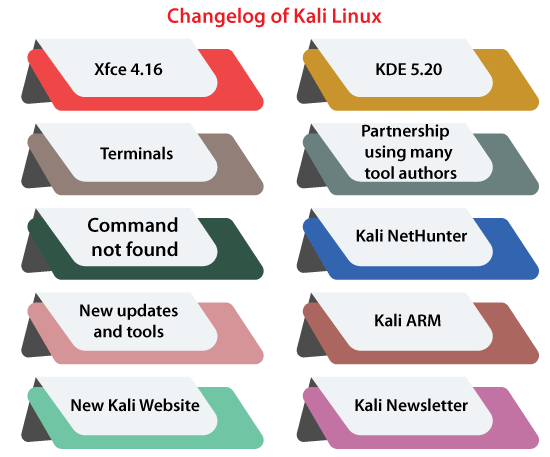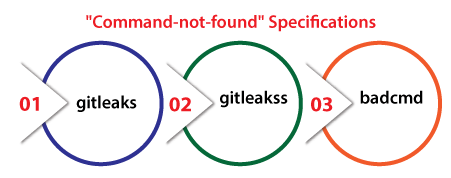Kali Linux Latest VersionIn this article, we are going to discuss the latest version of Kali Linux, i.e., Kali Linux 2021.1. This version gets developments of existing aspects and it is available to be upgraded and downloaded in case we have the existing Kali Linux installation. The following is the summary of a changelog from the 2020.4 version through 2020 November: 
Also, the kali project includes some different modifications:
KDE and Xfce UpdatesHow we select to interact with the kali version is completely up to us. We may wish to access kali remotely or locally, either on the command line or graphically. Even when we pick a technique, still there are many options we can select from like a desktop environment. Kali uses Xfce by default, but during the process of setup, permits for no GUI, KDE, or GNOME to be chosen. After the setup process is finished, we can install it. We have many pre-configurations for MATE, LXDE, i3, and Enlightenment as well. Hence, when the desktop environment brings an update, then they often develop day-to-day tasks for various users. It is best known straight through the authors, what's changed:
Terminal TweaksWe spend an important time amount using the command line when we prefer kali. We do it by a local machine many times (instead of in a remote SSH or console). Also, there are choices if it comes to a terminal with the desktop environment options. We have been working far on several terminals such as mate-terminal, qterminal, Konsole, tilix, tmux, and xfce4-terminal to "kali-fy" them. Searching Commands That Did Not Wish To Be DetectedIn Kali, we modified a default group of tools installed a while ago. Most of the users understand they back to the previous group of defaults (i.e., apt install kali-linux-large). However, for helping communicate our modifications and the new tools as well. Now, we have by default added command-not-found. It is a package, i.e., "optional". It can be deleted without deleting each kali-linux-default. The command-not-found command has some of the specifications which are mentioned below: 
If we are:
But it does not have to complete here. By including COMMAND_NOT_FOUND_INSTALL_PROMPT=1 to the environment of our shell (~/ .zshrc or ~/ .bashrc), then the command-not-found would take it a single step further. Also, it prompts us if we wish to install a missing package. Partnerships With Authors of ToolsWe have developed to support the following by carrying on through our old partnership with byt3bl33d3r: Joohoi: The "Fuzz Faster U Fool (in short ffuf)" creator. BC Security: Providing Kali early access (exclusive) to the "Empire" (powershell-empire) & "Starkiller" With Joohoi, the announcement is new for the 2021.1 version of Kali/ We could either sponsor him for getting the current access to ffuf or wait for 30 days until a source code becomes accessible like the old sponsorships. Although, he has announced that anyone who creates an important contribution, which will be accepted in the project, will get access as well. Kali Linux New ToolsIt will not be a Kali publication if there were not the new tools included. The following are a brief description of what is been included (within the network repositories) in this latest version of Kali Linux:
Website of Kali LinuxUntil recently, a single way we can be reading it will have been through our RSS feed or our blog directly. Kali Linux has a website which is known as "kali.org". We have moved away through WordPress to Hugo. Also, the website will be the rolling distribution similarly to Kali. The latest modification is mostly content and cosmetic and we've created plans for many new aspects to be included. Another switch upside is that we could take other benefits of what GitLab has for the offering. Recently. Wallpapers of Kali LinuxWe have tweaked our packages of wallpaper which are mentioned as follows: 
Updates of Kali NetHunterBusyBox is Kali NetHunter's core engine. It has received a deserved update to the "1.32.0-nethunter" version. Internally, BusyBox is used for ensuring that the NetHunter commands and tools are run consistently across the huge number of distinct vendor modifications and Android versions. This modification, whilst big, must go unnoticed via the users and will support many developers for porting the code to the NetHunter along with no difficulties at all. ARM Updates of KaliAs we may have heard that Apple has published new Macs along with their processors which are called Apple Silicon (in short Apple M1). However, the parallels have publicly published something that the users can apply for virtualization. We have produced both a live ISOs and installer to that end kali-linux-2021.1-live-arm64.iso and kali-linux-2021.1-installer-arm64.iso. These can be used with virtual machines on Apple Silicon Macs. Also, we have included support for the wireless card of the Raspberry Pi 400, but it is necessary to note that it is not any nexmon firmware because nexmon doesn't support it currently. The ARM build scripts of kali have seen some more developments through Francisco Jose Rodriguez Martos.
Next TopicKali Linux net hunter
|
 For Videos Join Our Youtube Channel: Join Now
For Videos Join Our Youtube Channel: Join Now
Feedback
- Send your Feedback to [email protected]
Help Others, Please Share









